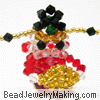新年快乐 Which means Happy New Year in Mandarin
Lunar New Year which is also known as the Spring Festival is one of the most important festivals for the Chinese and the most celebrated one.
Chinese New Year starts with the New Moon on the first day of the new year and ends on the full moon 15 days later. Or simply the first day to the fifteenth day of the Chinese calendar or lunisolar calendar - (The traditional concept arose with the cycle of moon phases)
The Chinese New Year celebration starts on the eve of the first day of new year which is commonly known as
除夕 (meaning to get rid of 夕 which is the name of a legendary man-eating beast that preys once a year on New Year Eve. When arrived, people use firecrackers to scare it away. People then joined together to celebrate for another year of safe life).
Not only the Chinese celebrates this festival but it is celebrated internationally in areas with large populations of ethnic Chinese, Chinese New Year is considered to be a major holiday for the Chinese as well as ethnic groups such as the Mongolians, Koreans, the Vietnamese, Tibetans, the Nepalese and the Bhutanese who were influenced by Chinese culture in terms of religious and philosophical worldview, language and culture in general. Chinese all around the world return home on the eve of Chinese New Year to have reunion dinners with their families.
New Year's day celebration includes 紅包 red envelopes or red packets (with money within) are given by senior members of the family, usually married, to unmarried junior members of the family. (Employers may also give red envelopes to their employees on the first working day after the festival).
Most importantly, the first day of Chinese New Year is a time where family members, in order of their seniority, will pay a visit to their oldest and most senior member of their family, usually their parents or grandparents, or even great grandparents.
|
|

